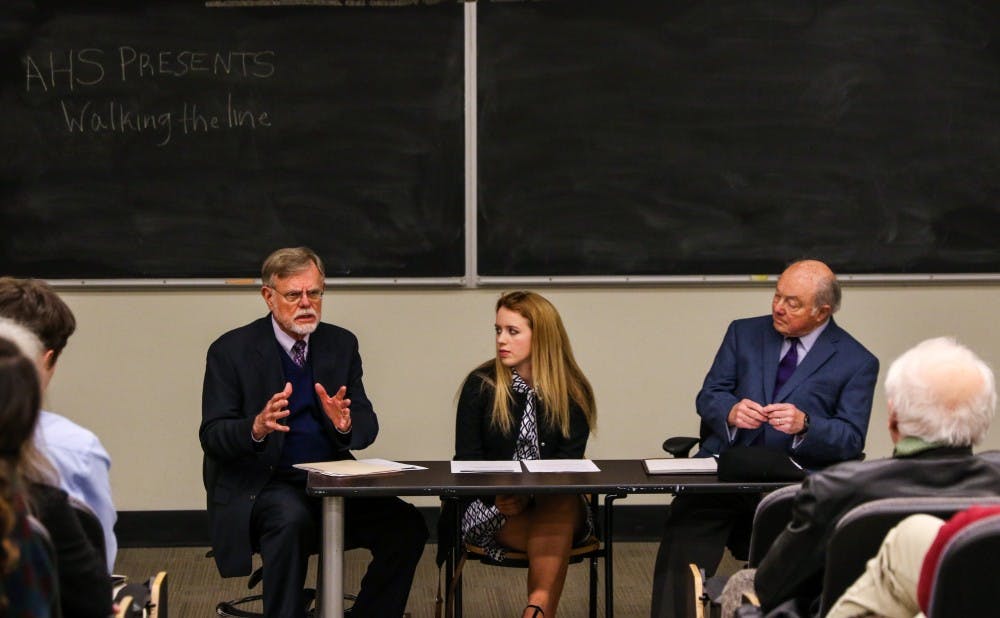Two experts debated how much the United States should be involved in Russia-related international conflicts Thursday evening.
Jack Matlock, Trinity ’50 and former U.S. ambassador to the Soviet Union, and Henry Nau, professor of political science and international affairs at George Washington University, spoke about U.S.-Russia relations and the best approach to handling Russia’s geopolitical influence. The event, which was hosted by the Alexander Hamilton Society, was attended by about 40 people.
“The question is really whether we are in a geopolitical competition with Russia. I would say absolutely not,” Matlock said. “We should not be, and if we put ourselves in a mindset to do that, we are going to repeat the mistakes that brought World War I and World War II.”
Both Matlock and Nau served in foreign policy capacities under President Ronald Reagan, who Nau said was perhaps “one of the great presidents in [American] history.”
Matlock, who is currently a Rubenstein Fellow, added that the greatest interest of American foreign policy is to avoid a nuclear war with Russia. What happens in Eastern Europe is largely irrelevant to U.S. interests, he said.
“Russia is not contesting us anywhere which is vital to our security,” Matlock said. He added that American intervention in Ukraine would be like getting into a Russo-Ukrainian “family fight.”
On the other hand, Nau argued that the U.S. should look to “stalemate” Putin’s new warfare by building up NATO and neutralizing Russia's military capacity.
“[Putin] is absolutely determined to reverse what he considers to be the geopolitical consequences of the end of the Cold War and the loss of the Soviet Empire,” Nau said. “I don't think that he has a plan that's Hitlerian in that sense, but I do think he has an objective.”
He noted that Putin is likely looking to encourage instability in Ukraine, Poland, Hungary and the Baltic States in order to weaken their ties with NATO and the European Union.
There is “no evidence whatsoever” that Putin is trying to reestablish the Soviet Union, Matlock responded.
“Number one, he can't do it, and number two, if by some miracle he did, it wouldn't be a threat to us because there would be so many people in dissident, it would be so weak,” he said.
Additionally, Matlock argued that Russia’s increased military presence was a reaction to the “fundamental mistake” of expanding NATO.
“Our own actions have created reactions,” he said. “These haven’t been good for Russia, but they haven’t been good for anybody.”
Nau disagreed with Matlock that the expansion of NATO led to the Russian invasion of Crimea.
“When NATO expanded, it did not—until the Crimean invasion—post a single military soldier in any of the new member states,” Nau said. “It did that deliberately to show that this was not a defense arrangement against the Russians, but that it was a way to reinforce some very fledgling and fragile regimes in these Eastern European countries that were coming out of seventy years of massive repression.”
Still, countering Russia’s invasion of Crimea would be hypocritical because the U.S. set precedent for such actions, Matlock said.
“We made war without U.N. approval against Serbia, we detached Kosovo from it and then we recognized Kosovo's independence in violation of our commitment,” he said. “As far as invading a country and making war, we invaded Iraq.”
Going forward, the U.S. should not immediately spring to the aid of every ally, Nau argued, but rather help countries, such as in Ukraine and Turkey.
“The battle for freedom on the borders of free Europe and Russia is very important, not the battles in Afghanistan or Iraq or, earlier, Vietnam,” he said. “There, we just take care of threat, we don't stick around and try to build purple finger democracies.”
Get The Chronicle straight to your inbox
Signup for our weekly newsletter. Cancel at any time.

